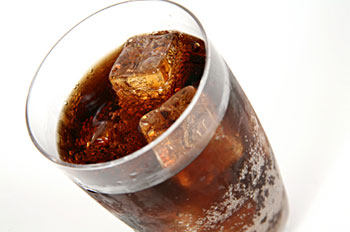More Health and Nutrition Bites
Related
Is drinking soda bad for you?
It is clear that soft drink consumption is a major contributor to health problems. I have had emails from industry representatives disputing this, but their argument that drinking Coke or Pepsi has nothing to do with obesity, diabetes and other health issues is fantasy. But they do make their living selling sweetened water: it is in their interest for you to continue to purchase their products.
Soda and Stroke
Did you know that as of 2009, the average American drinks over 45 GALLONS of carbonated beverages, both sugar-sweetened and non-caloric, per year? It's the single largest source of added sugar in our diet.
Sugared soda drinkers more likely to develop type 2 diabetes
A Finnish study reported in the Journal of Nutrition (2007;137:1447-1454) shows a link between sugared soft drink consumption and the development of type 2 diabetes.
Health & Nutrition Bites
Get the latest health and diet news - along with what you can do about it - sent to your Inbox once a week. Get Dr. Gourmet's Health and Nutrition Bites sent to you via email. Sign up now!
What The American Beverage Association wants you to think

When I am asked to speak or give an interview about health, diet, and nutrition, I am very careful to make it clear that I am an evidence-based physician. In the last thirty-plus years there has been an explosion of high quality research into diet and nutrition, and when I say "high quality research" I mean that it is well-designed, of an appropriate size, funded by disinterested parties, and published in a reputable, peer-reviewed medical journal.
Yet sometimes what appears to be of high quality simply isn't, and today's Health & Nutrition Bite is one of them.
Researchers at the University of Colorado and Temple University teamed up to compare drinking water with drinking beverages sweetened with non-nutritive sweeteners (meaning products like aspartame, stevia, or Splenda®) as part of a weight-loss study (Obesity 2014;22(6):1415-1421). Their stated hypothesis was that people would lose the same amount of weight regardless of whether they drank water or a diet drink. 279 men and women, all overweight or obese and without health conditions that might affect weight loss, participated in a 12-week weight loss program known as The Colorado Weigh. This included weekly educational meetings and weigh-ins along with reducing calories and increasing physical activity. The goal was a very reasonable weight loss of just 1-2 pounds per week.
Half of the participants were asked to refrain from drinking any beverage that contained non-nutritive sweeteners or adding non-nutritive sweeteners to other beverages. They could, however consume those sweeteners if they were present in other foods in their diet. Instead, they were instructed to drink at least 24 ounces of water per day.
The other half of the participants were instructed to drink at least 24 ounces per day of a beverage sweetened with a non-nutritive sweetener. Any type of such beverage that had less than 5 calories per 8-ounce serving, was pre-mixed, and contained the designated sweeteners counted, so they could choose anything from, say, a diet iced tea to Diet Coke.
Both groups were asked to keep daily beverage logs to track their beverage consumption and were supplied with manufacturer's coupons from Coca-Cola, PepsiCo, and Dr Pepper Snapple Group to redeem for bottled water or other beverages at retail store.
After 12 weeks, those drinking the beverages containing non-nutritive sweeteners lost more weight than those drinking water. How much more? On average, about 1.85 kilograms, or about 4 pounds. More interestingly, their total cholesterol and LDL cholesterol (the bad cholesterol) scores improved more than those in the water group.
What this means for you
You'll see this study under headlines like "Diet soda improves weight loss" and the like. The problem, however, is that this study was fully funded by The American Beverage Association, whose largest members include (surprise!) Coca-Cola, PepsiCo, and Dr Pepper Snapple Group. Worse yet, two of the authors of the study have received consulting fees for work they've done for Coca-Cola in the past.
As an evidence-based physician, I simply can't take this research very seriously - this is akin to the research into smoking carried out by researchers funded by the tobacco companies. While this is an interesting study, the funding source taints the quality of the work. My recommendation remains that your beverage of choice should be water, coffee, or tea.
First posted: May 28, 2014
